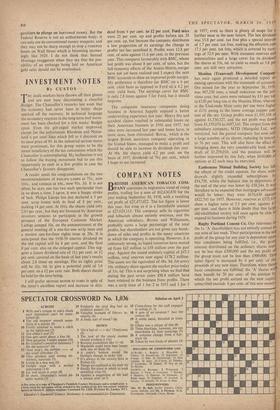INVESTMENT NOTES
By CUSTOS
THE stock markets have thrown off their gloom and are now busy discounting a cheerful Budget. The Chancellor's remarks last week that the economy had never been in better shape sparked off the recovery. In technical language the secondary reaction in the long-term bull move- ment has been checked for a few weeks' Budget spree. Even the gilt-edged market improved, except for the unfortunate Rhodesia and Nyasa- land 6 per cent. loan which fell to 4 discount on its issue price of 99. In the industrial section stores were prominent, for this group seems to be the surest beneficiary of the tax concessions which the Chancellor is contemplating. My inclination is not to follow the buying movement but to use this opportunity to cash in a few profits in case the Chancellor's favours disappoint.
A reader sends his congratulations on the two recommendations of PHILIPS LAMPS at 75s., now 10Is., and LIEBIGS at 64s., now 91s. 3d. It is not - often, he says, one has two such spectacular rises in so short a time., I agree, it was a happy stroke of luck. Philips Lamps has just declared a 5 per cent. scrip bonus with its final of 8 per cent., making 14 per cent. At 101s. the shares yield only 2.65 per cent., but they are favoured by American investors anxious to participate in the growth prospect of the European Common Market. Liebigs jumped 10s. on the announcement at the general meeting of a one-for-one scrip issue and a modest one-for-four rights issue at 20s. It is anticipated that the 1958-59 interim dividend on the old capital will be 8 per cent. and the final 8 per cent. also on the enlarged capital. This sug- gests a future dividend rate of 114 per cent. or 12 per cent. covered on the basis of last year's results about 2.8 times on earnings. The ex rights price will be 42s. 9d. to give a potential yield of 5.6 per cent. on a 12 per cent. rate. Both shares should be held for the time being.
i still prefer BRITISH MOTOR to FORD in spite of the latter's excellent report and increase in divi- dend from 9 per cent. to 12 per cent. Ford sales were 25 per cent, up and profits before tax 35 per cent. up, but because the company distributes a low proportion of its earnings the change in profits tax has penalised it. Profits were 12.8 per cent, of sales against 11.6 per cent, in the previous year. This compares favourably with BMC, whose last profit was about 8 per cent, of sales, but the full economy effects of the Austin-Morris, merger have not yet been realised and I expect the next BMC accounts to show an improved profit margin. My preference is therefore for BMC on a 6 per cent. yield basis as opposed to Ford on a 4.2 per cent. yield basis. The earnings cover for BMC is only 2.8 times against 5 for Ford, but it should improve.
The composite insurance companies doing business in America happily enjoyed a better underwriting experience last year. Heavy fire and accident claims resulted in substantial losses on their American business in 1956 and 1957, but rates were increased last year and losses have, in most cases, been eliminated. ROYAL, which is the largest British insurance company operating in the United States, managed to make a profit and should be able to increase its dividend this year. At 90s. the shares yield 4.2 per cent, on the basis of 1957, dividends of 76f per cent., which 1 hope to see increased.


































 Previous page
Previous page